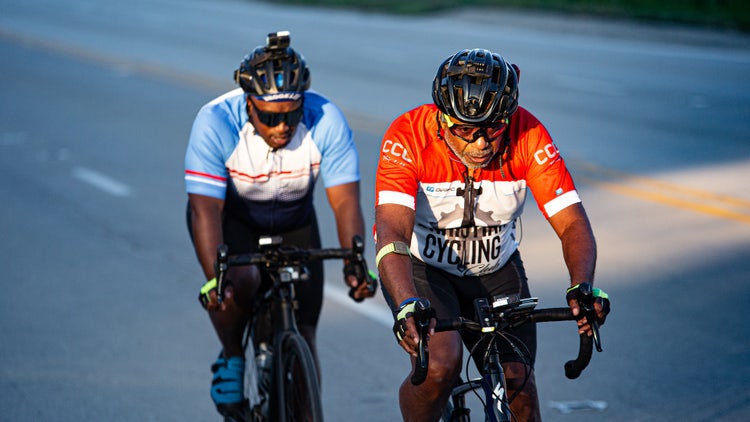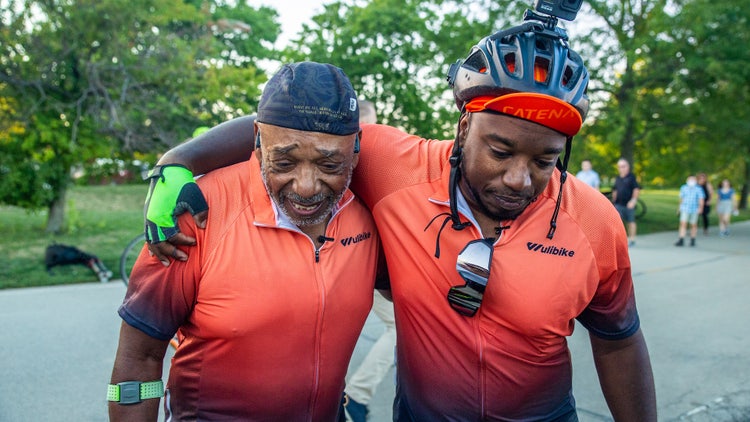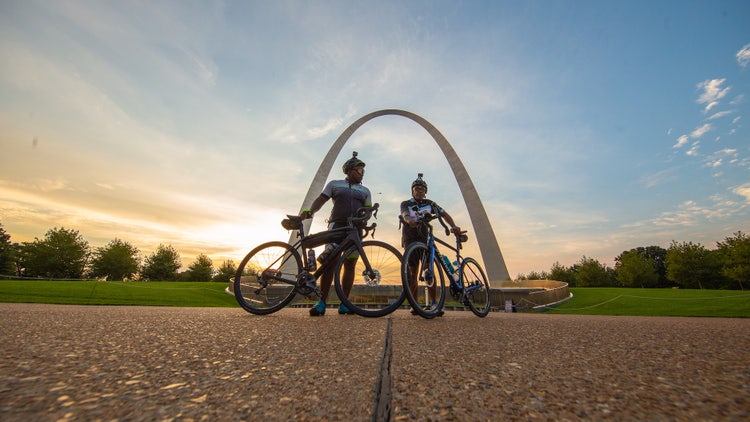Image

Image Credit
Timothy M. Schmidt
Image Alt
Eric D. Seals and Donnie Seals, Sr.
Image Size
landscape-medium
Image Position
center
For Eric D. Seals, filmmaking is second nature. For years, he documented moments of his family’s life, often capturing the ordinary alongside the extraordinary. But when he picked up his camera to film his father, Donnie Seals Sr., playing tennis one day, he had no idea it would lead to a transformative project. Eric’s father had been through three open-heart surgeries and had suffered a near-fatal heart attack. His health struggles shaped their family’s life in ways that weren’t always openly discussed. But after seeing himself through the view of a lens, Donnie Sr. had a revelation.
“He got super depressed,” Eric recalled. “He was like, ‘Man, I haven’t seen myself on camera in a long time. I need to go make a change. I’m going to buy a bike tomorrow.’”
At first, Eric was skeptical. His father had been through so much — was cycling really the best idea? But Donnie Sr. was determined. And so, at 65 years old, he started pedaling.
From a personal journey to a nationally recognized film
What began as a commitment to better health soon evolved into something greater. Eric, inspired by his father’s dedication, began riding alongside him. The two started cycling regularly, and as their rides grew longer, so did their conversations about life and legacy. Initially, Eric had no plans to turn this into a film. But the more he shared his father’s story with others, the more people encouraged him to document it in a bigger way.
“It was really the community around me that said, ‘You should make a full story out of this,’” he said. That encouragement led to Bike Vessel, a documentary chronicling a four-day, 350-mile bike ride from St. Louis to Chicago. The film, however, is about more than just a physical challenge. It’s a story about perseverance, Black health inequities and the power of movement.
For Donnie Sr., seeing how far the project had come was surreal. “My son said, ‘Hey, I want to film you.’ And we threw some GoPros on a bike,” he said. “I had no idea it could go to this level.” Their story would go on to reach a national audience through PBS’ Independent Lens, where Bike Vessel premiered, sparking conversations far beyond what either of them imagined. The documentary is now available to stream in full on PBS’ YouTube page, allowing even more people to witness their journey.
The mental and physical toll of the ride
Cycling 350 miles in just four days is a test of strength. For Eric, it was also a mental battle. “As a filmmaker and a participant, it was one of the hardest things I’ve ever done,” he admitted. “Ask me if I’d do it again. The answer is no.”
The toughest day came on day three, when Eric faced multiple flat tires, exhaustion and the mounting responsibilities of directing the film while physically completing the ride. At one point, frustration nearly got the best of him. “I told my dad, ‘Hey bro, this was cute, but I’m done,’” he said. But Donnie Sr. wasn’t quitting. And he knew exactly how to keep his son going.
“He said, ‘Are you going to let me ride by myself?’” Eric recalled. “And I was like, ‘D**n, I’m not.’ So, we kept going.” That moment, more than any other, encapsulated what the ride was about: Pushing forward, together.
Image




Image Credit
Timothy M. Schmidt
Image Alt
Eric D. Seals and Donnie Seals, Sr.
Image Size
landscape-medium
Image Position
center
Beyond the endurance challenge, the film also uncovered deeply personal truths about their family. As Eric documented his father’s transformation, he also discovered stories they had never fully talked about. “Families don’t really discuss what people were going through when someone had a major illness,” he said. “It’s like, ‘Woo, we made it!’ But no one talks about what it was like during that time.”
Through filming, Eric learned more about how his mother held the household together while his father was in and out of hospitals. He learned that his sister remembered every detail of those years, while his brother — Donnie Seals Jr., who was an integral part of the film’s production — remembered almost nothing. And he realized how much his father’s struggles affected everyone, not just the man going through them.
Donnie Sr., too, had moments of reflection. He recalled the first time he craved a Snickers bar after getting out of the hospital. “My daughter said, ‘Dad, I can’t watch you do it,’” he shared. “She told me, ‘You weren’t there at 2 a.m. when we were trying to figure out if you were going to make it through the night.’” Hearing that put things into perspective. His journey to better health was not only for him but for the people who loved him.
Black health disparities and the fight to take control
Beyond being a personal journey, Bike Vessel highlights systemic injustices Black men face — disparities Donnie Sr. experienced firsthand. After one of his open-heart surgeries, he knew something still wasn’t right. But when he voiced his concerns, a doctor brushed him off.
“They told me, ‘That’s just post-surgical pain,’” he recalled. “One doctor even said, ‘We opened you up like a chicken. What do you expect?’”
He knew he wasn’t being treated properly, so he sought better care at the Mayo Clinic, where he finally received the attention and support he needed. “I didn’t get caught up in the racial thing,” Donnie Sr. said. “I got caught up in the fact that I wasn’t treated right. And getting caught up in the racial thing wouldn’t make my situation better. Finding the right doctor did.”
Eric, on the other hand, took a broader look at how generational habits contribute to poor health outcomes. “We think it’s genetics, but really, we eat like our grandparents did,” he said. “If they ate a certain way and had health problems, and you eat the same way, you’re going to have the same health problems.”
That realization shaped his own approach to wellness. “I’m really trying to take hold of my stress,” he said. “Stress is a silent killer. It’s death by a thousand paper cuts.”
The legacy of Bike Vessel
Since its release in February, the documentary has continued to reach audiences across different communities. “One time on the South Side of Chicago, people just started singing a gospel song in the middle of it,” Donnie Sr. said. “The film isn’t just ours anymore. It belongs to the people.” For Eric, the biggest reward has been seeing people walk away inspired. “At the end of every screening, someone comes up to my father and says, ‘I’m going to start tomorrow,’” he shared. “And that’s all we ever wanted.”
Beyond the film itself, the official website offers deeper insights into the production, the crew and the journey behind it. It also serves as a hub for those inspired to start their own cycling journeys, providing information on purchasable performance shirts and cycling jerseys — gear that represents the mission of pushing forward, no matter the challenge.
Image




Image Alt
Eric D. Seals and Donnie Seals, Sr.
Image Size
landscape-medium
Image Position
center
If there’s one message the Seals family wants to share, it’s this: Find your vessel.
“It might not be cycling,” Eric said. “It could be running, dancing, pickleball — whatever gets you moving and makes you happy.”
Donnie Sr. agreed. “I’m blessed I found cycling,” he said. “But whatever you love, do it. If you love it, you’ll keep doing it.” As Eric puts it, borrowing from one of the doctors featured in the film: “If you’re above ground, it’s not too late.”
Their story is proof that change is possible at any stage in life. Whether it starts on a bike, a dance floor or a simple daily walk — the journey to better health begins with a single step. And as Bike Vessel reminds us, what you choose to put into your body is just as powerful — if not more so — than any physical activity you take on.


